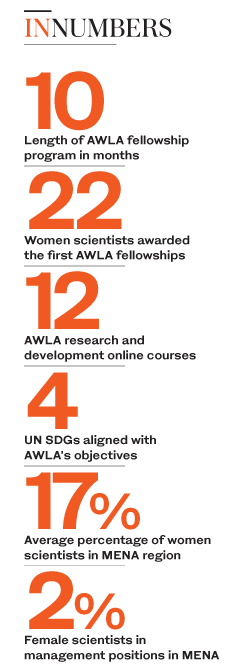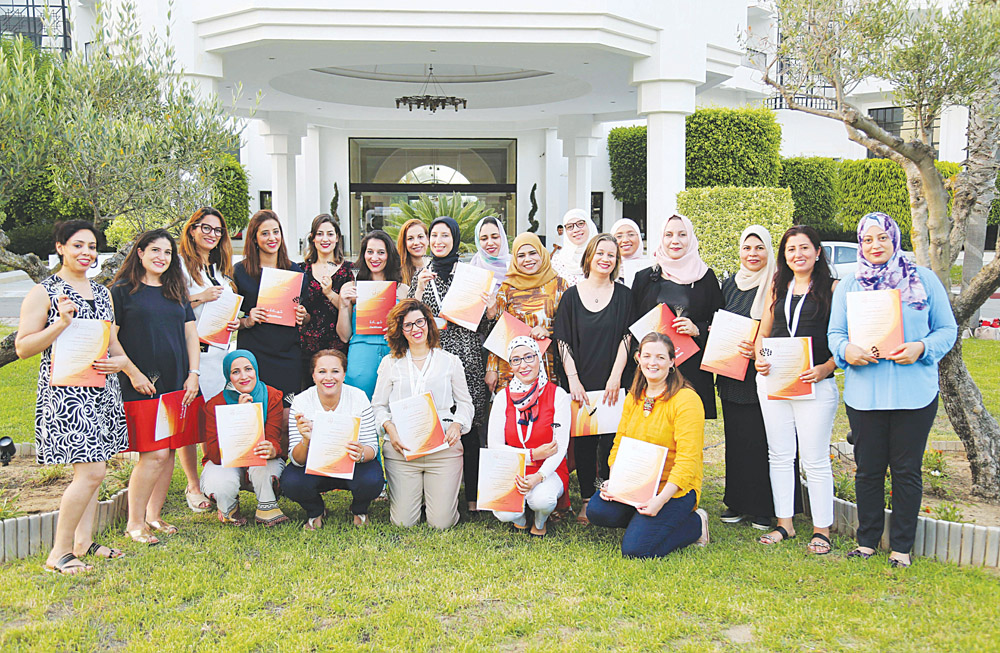DUBAI: Imagine a program that aims to develop a pool of Arab women researchers who can make a positive impact in their workplaces, communities and countries. Next, imagine a program that seeks to utilize the talents of these researchers to achieve agricultural prosperity and also addresses the career challenges they face.
Now imagine a single program that combines those two objectives plus advances the UN’s goal of achieving “a more sustainable future for all.” Established recently by the International Center for Biosaline Agriculture (ICBA), Dubai, the program is called Arab Women Leaders in Agriculture (AWLA).
Funded by the Bill and Melinda Gates Foundation, the Islamic Development Bank (IsDB) and the CGIAR Research Program on Wheat, AWLA seeks to develop a cadre of Arab women researchers equipped with the knowledge and leadership skills to advance the goal of agricultural sustainability and food security in the Middle East and North Africa (MENA) region.
Far away from the glare of the media, a cohort of 22 women scientists from Algeria, Egypt, Jordan, Lebanon, Morocco and Tunisia recently became the first AWLA fellows. As members of the region’s first networking platform for female researchers working in various agricultural and food security-related disciplines, they will address pressing regional challenges.
“We believe women in management will understand the challenges better,” Dr. Ismahane Elouafi, ICBA’s director general, told Arab News. “The fact that very highly educated women get stuck in lower positions doesn’t give a country the full advantage of female education.
“Once you have a woman at the helm of an organization, you have what I call ‘soft leadership’. It’s about engagement.”
Elouafi said the idea of AWLA began two years ago, designed based on data from the Arab world.
The numbers showed that female representation was strong regionally at university level — around 50 percent — but made up less than two percent at the management level in the workplace. On average, just 17 percent of scientists across the region are women, the lowest rate in the world.
“Agriculture employs a large number of women, mainly at factory, food-processing and farming levels,” Elouafi said.
“Yet we see very few women in the upper management of scientific organizations, specifically in agriculture. This means there is something wrong.”
She said the name AWLA — which means “I am worthy” in Arabic — was chosen because “we wanted an Arabic word that meant that every Arab woman should be invested in to provide her with the opportunity to advance her career.”

The 22 Arab women scientists from across the Middle East and North Africa selected for the first fellowships under the AWLA program. (Supplied photo)
The first phase of AWLA commenced with an eight-day workshop on June 30 in Tunis, involving mentoring, orientation classes and positive leadership sessions. The 10-month program will be conducted in Tunisia and the UAE, and will include three face-to-face learning modules and 12 research and development online courses.
A critical element of the program is team-based academic “capstone projects,” which will give the participants an opportunity to apply the skills, tools and knowledge they will have gained during the 10-month fellowship. To encourage diversity and inclusion, the teams comprise fellows from different countries and backgrounds. The idea is to encourage interaction between the team members.
At the end of the program, the fellows will have to present their projects and hold discussions with potential funders.
“Through this first workshop, I have started to find myself,” said Dr. Hasna Ellouzi, an assistant researcher at the Biotechnology Center of Borj Cedria in Hammam-Lif, Tunisia.
“Now I believe that every step, every second of my journey depends on me. I now see my goals. They are in my hands and I am sure that through AWLA, I will be able to achieve them.”
We believe every woman given an opportunity to go through the mentorship program can advance her career.”
To meet the expectations of Ellouzi and other fellows, AWLA will facilitate their access to leadership roles; promote research excellence and impact; encourage gender-responsive working cultures and enabling environments; and provide a platform for highlighting their intellect, capability and contribution.
Elouafi, the ICBA head, has few illusions about where the problems lie. “We have still a male-dominated leadership in this region, not just in agriculture and science,” she said. “And the reasons behind this phenomenon are both cultural and biological. Many women want to have a family.”
At the same time, according to Elouafi, women have an edge over men in the way they lead. “It’s not only about rules and responsibilities, hours and deliverables, or being tough,” she said. “It is much more about engagement, fulfilling yourself and delivering.
“I don’t see it much with male leaders because it takes a lot of emotional intelligence, an area where women have a natural advantage.”
The difference AWLA could make at an individual level is obvious to Dr. Mounira Azouz, a fellow from Algeria who works as a food scientist at Algeria’s National Institute of Agricultural Research. “The fellowship is a huge opportunity for me,” she said, “to improve my skills and learn new tools to enhance my capability for leadership roles in the food and agriculture sector.”
On a broader scale, AWLA is aligned with four of the UN’s Sustainable Development Goals (SDGs) — on gender equality (SDG 5), climate action (SDG 13), life on land (SDG 15), and partnerships for the goals (SDG 17).
As AWLA’s website puts it, the program’s “long-term goal goes beyond capacity development and includes improved food security and nutrition, a better research and development landscape, and economic and social benefits of a narrowed gender gap in the region.”
According to Dr. Mouldi El-Felah, a professor of agronomy and genetics from Tunisia, “The program is very important and very innovative. What I found during the workshop is that the approach is very clear and helpful for women fellows who will take on leadership roles in agriculture in the future.
“In this way, AWLA works to address an important issue, namely the gender gap in the region.”
Ultimately, AWLA is about giving female Arab scientists the equal opportunity they deserve, Elouafi said.
“We believe that every woman who is given an opportunity to go through the mentorship and leadership program, can eventually acquire the skills necessary for advancing her career.
“Most of these women didn’t get the opportunity to develop their leadership abilities. So we are hoping that once they get the opportunity, they will see how enjoyable the job and experience could be. This will make them interested in managerial positions.”
















